Federation University Taxation Law Assignment: Harding Case Analysis
VerifiedAdded on 2022/11/29
|9
|2588
|218
Essay
AI Summary
This essay analyzes the Harding v Commissioner of Taxation case, focusing on the tax implications for Australians living abroad. The case revolves around Mr. Harding's tax residency status, examining the application of the ordinary concept test and the permanent place of abode test. The essay explores how these tests determine whether an individual is considered a resident for tax purposes, even when working overseas. It discusses the importance of domicile, intentions to establish permanent residency elsewhere, and the implications of owning a permanent place of abode. The analysis covers the tax implications for expatriates, the factors considered in determining residency, and the impact of cases like Handsley v Commissioner of Taxation. The essay emphasizes the significance of establishing a permanent home outside Australia to avoid being taxed as a resident and the court's interpretation of temporary versus permanent accommodation. The analysis also touches upon the importance of establishing tax residency in another country to be considered a non-resident in Australia.
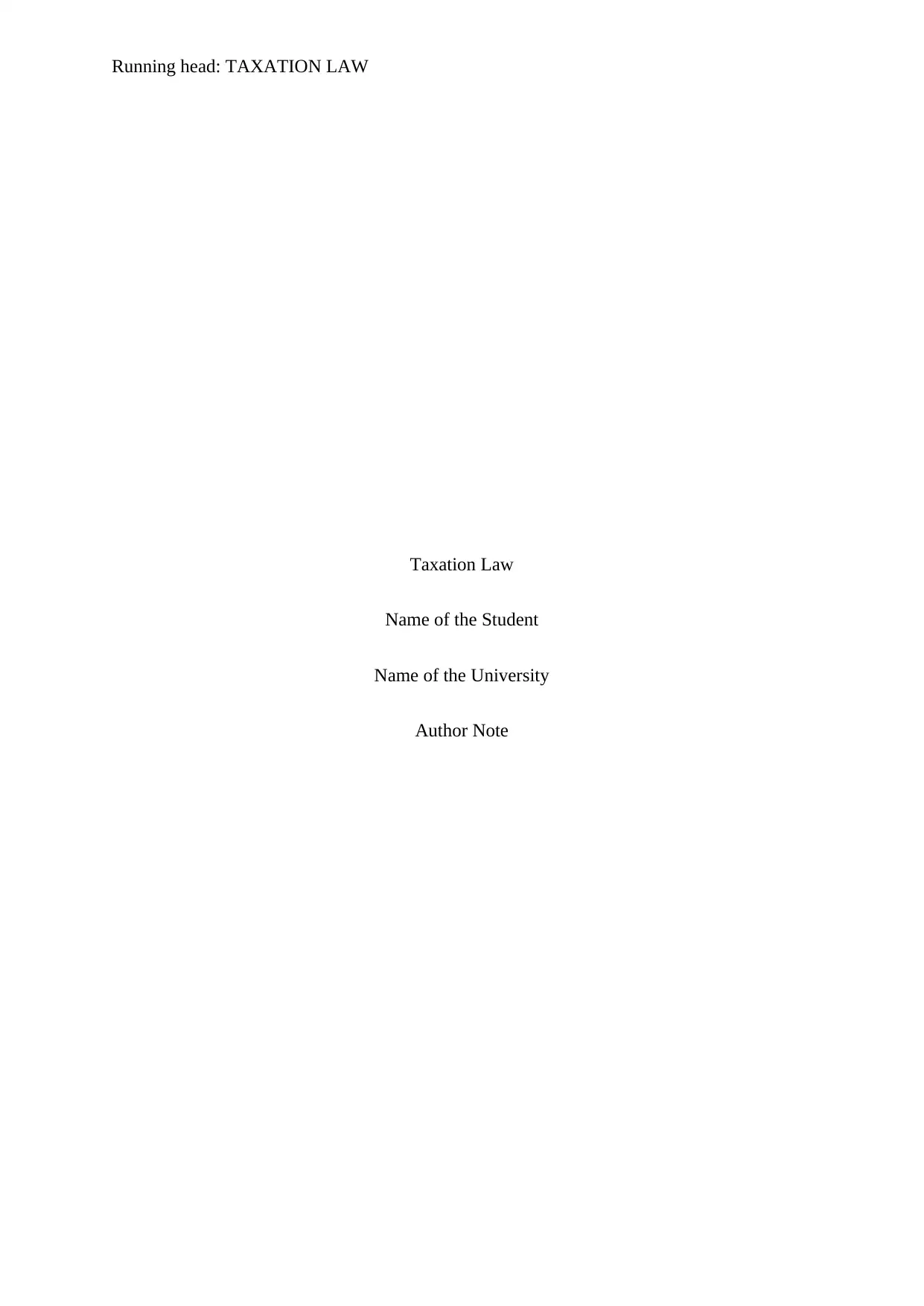
Running head: TAXATION LAW
Taxation Law
Name of the Student
Name of the University
Author Note
Taxation Law
Name of the Student
Name of the University
Author Note
Paraphrase This Document
Need a fresh take? Get an instant paraphrase of this document with our AI Paraphraser
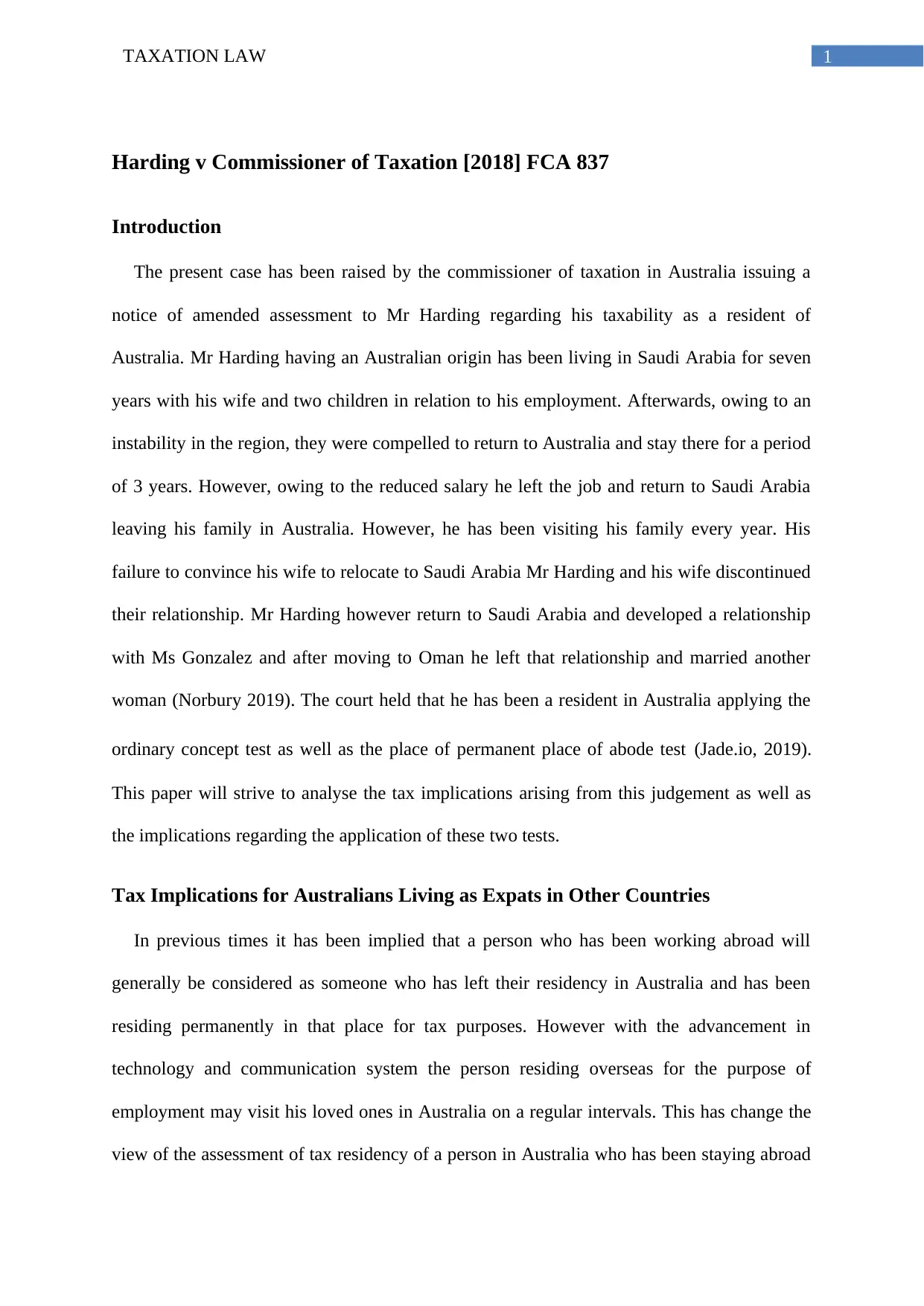
1TAXATION LAW
Harding v Commissioner of Taxation [2018] FCA 837
Introduction
The present case has been raised by the commissioner of taxation in Australia issuing a
notice of amended assessment to Mr Harding regarding his taxability as a resident of
Australia. Mr Harding having an Australian origin has been living in Saudi Arabia for seven
years with his wife and two children in relation to his employment. Afterwards, owing to an
instability in the region, they were compelled to return to Australia and stay there for a period
of 3 years. However, owing to the reduced salary he left the job and return to Saudi Arabia
leaving his family in Australia. However, he has been visiting his family every year. His
failure to convince his wife to relocate to Saudi Arabia Mr Harding and his wife discontinued
their relationship. Mr Harding however return to Saudi Arabia and developed a relationship
with Ms Gonzalez and after moving to Oman he left that relationship and married another
woman (Norbury 2019). The court held that he has been a resident in Australia applying the
ordinary concept test as well as the place of permanent place of abode test (Jade.io, 2019).
This paper will strive to analyse the tax implications arising from this judgement as well as
the implications regarding the application of these two tests.
Tax Implications for Australians Living as Expats in Other Countries
In previous times it has been implied that a person who has been working abroad will
generally be considered as someone who has left their residency in Australia and has been
residing permanently in that place for tax purposes. However with the advancement in
technology and communication system the person residing overseas for the purpose of
employment may visit his loved ones in Australia on a regular intervals. This has change the
view of the assessment of tax residency of a person in Australia who has been staying abroad
Harding v Commissioner of Taxation [2018] FCA 837
Introduction
The present case has been raised by the commissioner of taxation in Australia issuing a
notice of amended assessment to Mr Harding regarding his taxability as a resident of
Australia. Mr Harding having an Australian origin has been living in Saudi Arabia for seven
years with his wife and two children in relation to his employment. Afterwards, owing to an
instability in the region, they were compelled to return to Australia and stay there for a period
of 3 years. However, owing to the reduced salary he left the job and return to Saudi Arabia
leaving his family in Australia. However, he has been visiting his family every year. His
failure to convince his wife to relocate to Saudi Arabia Mr Harding and his wife discontinued
their relationship. Mr Harding however return to Saudi Arabia and developed a relationship
with Ms Gonzalez and after moving to Oman he left that relationship and married another
woman (Norbury 2019). The court held that he has been a resident in Australia applying the
ordinary concept test as well as the place of permanent place of abode test (Jade.io, 2019).
This paper will strive to analyse the tax implications arising from this judgement as well as
the implications regarding the application of these two tests.
Tax Implications for Australians Living as Expats in Other Countries
In previous times it has been implied that a person who has been working abroad will
generally be considered as someone who has left their residency in Australia and has been
residing permanently in that place for tax purposes. However with the advancement in
technology and communication system the person residing overseas for the purpose of
employment may visit his loved ones in Australia on a regular intervals. This has change the
view of the assessment of tax residency of a person in Australia who has been staying abroad
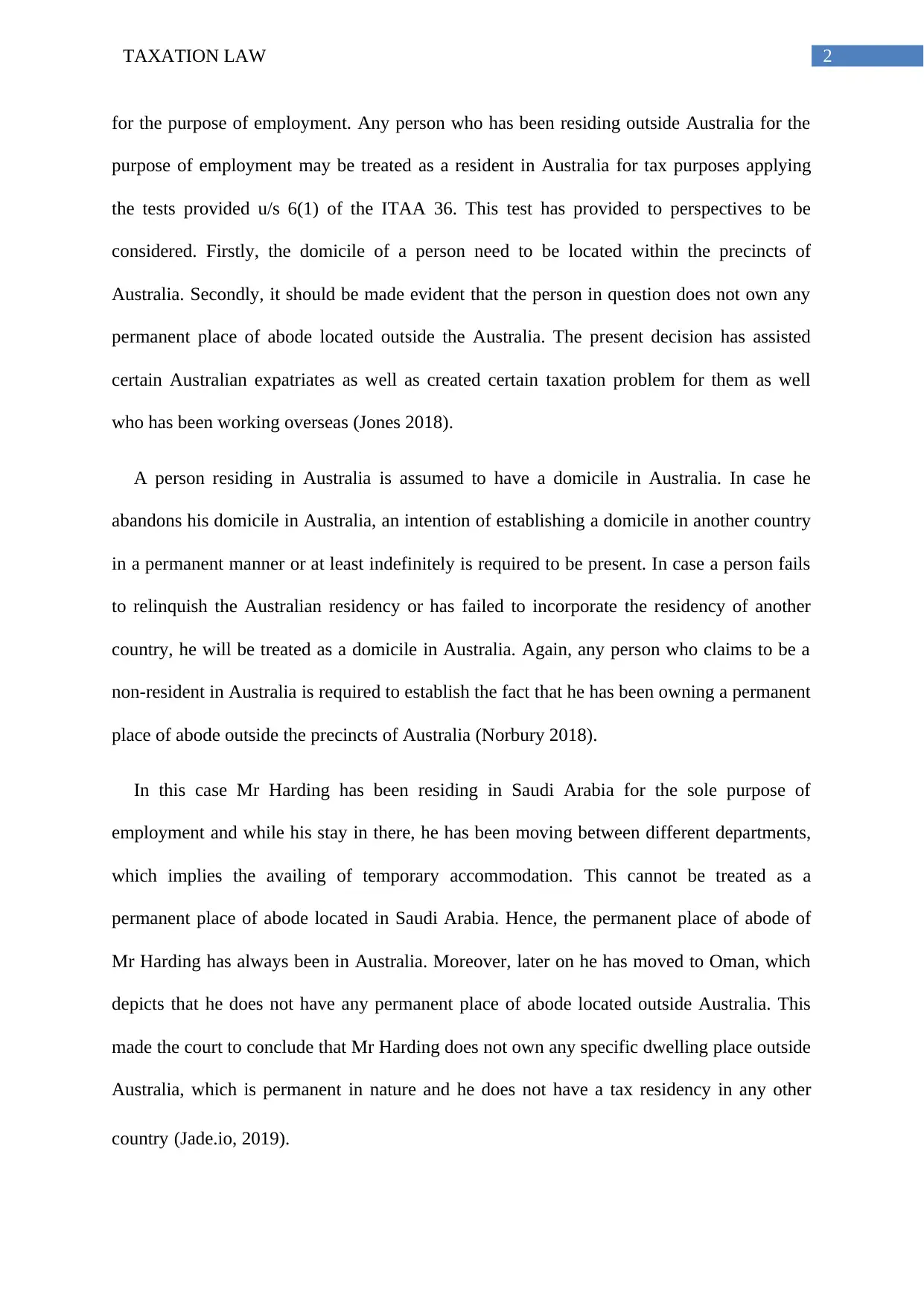
2TAXATION LAW
for the purpose of employment. Any person who has been residing outside Australia for the
purpose of employment may be treated as a resident in Australia for tax purposes applying
the tests provided u/s 6(1) of the ITAA 36. This test has provided to perspectives to be
considered. Firstly, the domicile of a person need to be located within the precincts of
Australia. Secondly, it should be made evident that the person in question does not own any
permanent place of abode located outside the Australia. The present decision has assisted
certain Australian expatriates as well as created certain taxation problem for them as well
who has been working overseas (Jones 2018).
A person residing in Australia is assumed to have a domicile in Australia. In case he
abandons his domicile in Australia, an intention of establishing a domicile in another country
in a permanent manner or at least indefinitely is required to be present. In case a person fails
to relinquish the Australian residency or has failed to incorporate the residency of another
country, he will be treated as a domicile in Australia. Again, any person who claims to be a
non-resident in Australia is required to establish the fact that he has been owning a permanent
place of abode outside the precincts of Australia (Norbury 2018).
In this case Mr Harding has been residing in Saudi Arabia for the sole purpose of
employment and while his stay in there, he has been moving between different departments,
which implies the availing of temporary accommodation. This cannot be treated as a
permanent place of abode located in Saudi Arabia. Hence, the permanent place of abode of
Mr Harding has always been in Australia. Moreover, later on he has moved to Oman, which
depicts that he does not have any permanent place of abode located outside Australia. This
made the court to conclude that Mr Harding does not own any specific dwelling place outside
Australia, which is permanent in nature and he does not have a tax residency in any other
country (Jade.io, 2019).
for the purpose of employment. Any person who has been residing outside Australia for the
purpose of employment may be treated as a resident in Australia for tax purposes applying
the tests provided u/s 6(1) of the ITAA 36. This test has provided to perspectives to be
considered. Firstly, the domicile of a person need to be located within the precincts of
Australia. Secondly, it should be made evident that the person in question does not own any
permanent place of abode located outside the Australia. The present decision has assisted
certain Australian expatriates as well as created certain taxation problem for them as well
who has been working overseas (Jones 2018).
A person residing in Australia is assumed to have a domicile in Australia. In case he
abandons his domicile in Australia, an intention of establishing a domicile in another country
in a permanent manner or at least indefinitely is required to be present. In case a person fails
to relinquish the Australian residency or has failed to incorporate the residency of another
country, he will be treated as a domicile in Australia. Again, any person who claims to be a
non-resident in Australia is required to establish the fact that he has been owning a permanent
place of abode outside the precincts of Australia (Norbury 2018).
In this case Mr Harding has been residing in Saudi Arabia for the sole purpose of
employment and while his stay in there, he has been moving between different departments,
which implies the availing of temporary accommodation. This cannot be treated as a
permanent place of abode located in Saudi Arabia. Hence, the permanent place of abode of
Mr Harding has always been in Australia. Moreover, later on he has moved to Oman, which
depicts that he does not have any permanent place of abode located outside Australia. This
made the court to conclude that Mr Harding does not own any specific dwelling place outside
Australia, which is permanent in nature and he does not have a tax residency in any other
country (Jade.io, 2019).
⊘ This is a preview!⊘
Do you want full access?
Subscribe today to unlock all pages.

Trusted by 1+ million students worldwide
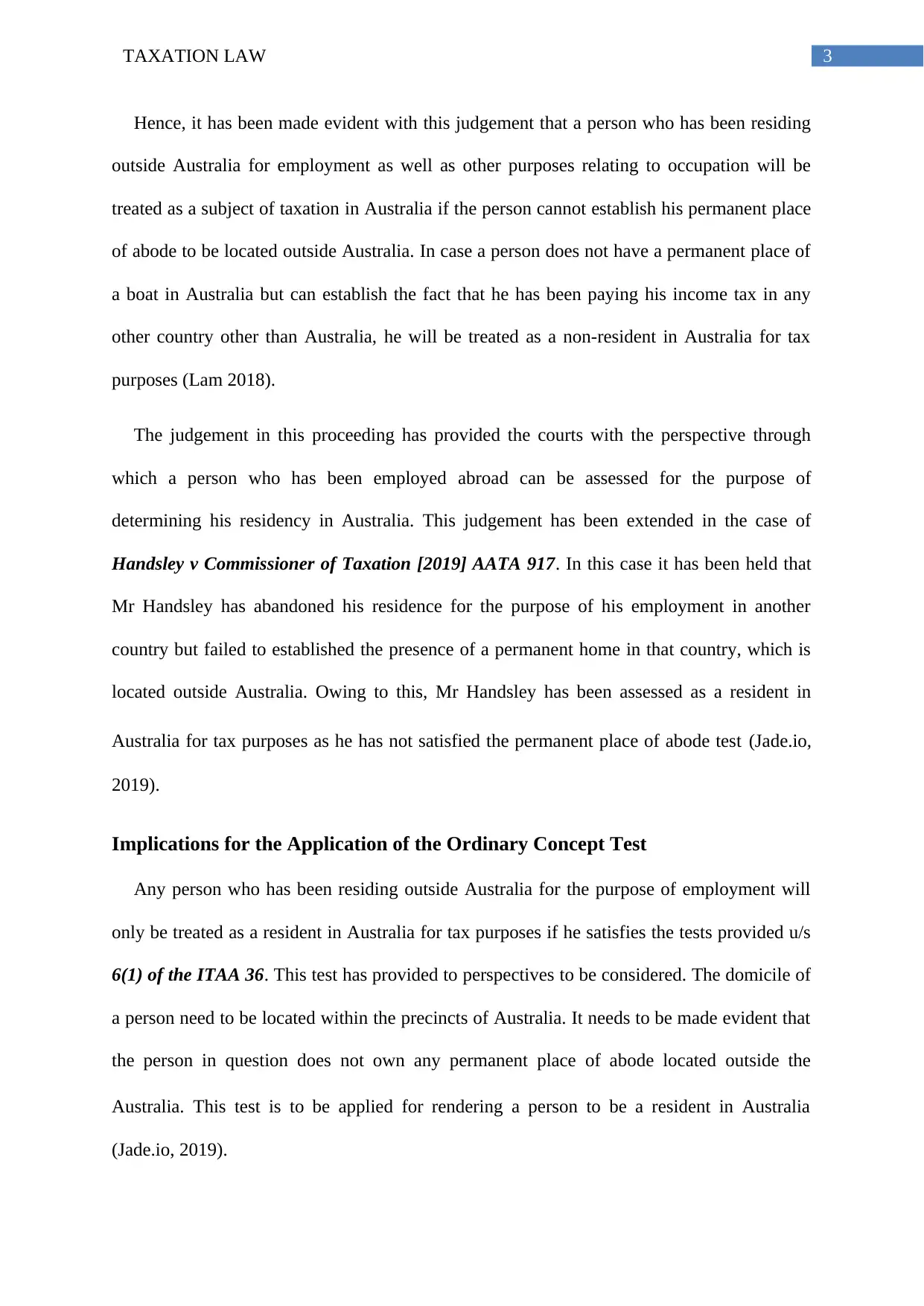
3TAXATION LAW
Hence, it has been made evident with this judgement that a person who has been residing
outside Australia for employment as well as other purposes relating to occupation will be
treated as a subject of taxation in Australia if the person cannot establish his permanent place
of abode to be located outside Australia. In case a person does not have a permanent place of
a boat in Australia but can establish the fact that he has been paying his income tax in any
other country other than Australia, he will be treated as a non-resident in Australia for tax
purposes (Lam 2018).
The judgement in this proceeding has provided the courts with the perspective through
which a person who has been employed abroad can be assessed for the purpose of
determining his residency in Australia. This judgement has been extended in the case of
Handsley v Commissioner of Taxation [2019] AATA 917. In this case it has been held that
Mr Handsley has abandoned his residence for the purpose of his employment in another
country but failed to established the presence of a permanent home in that country, which is
located outside Australia. Owing to this, Mr Handsley has been assessed as a resident in
Australia for tax purposes as he has not satisfied the permanent place of abode test (Jade.io,
2019).
Implications for the Application of the Ordinary Concept Test
Any person who has been residing outside Australia for the purpose of employment will
only be treated as a resident in Australia for tax purposes if he satisfies the tests provided u/s
6(1) of the ITAA 36. This test has provided to perspectives to be considered. The domicile of
a person need to be located within the precincts of Australia. It needs to be made evident that
the person in question does not own any permanent place of abode located outside the
Australia. This test is to be applied for rendering a person to be a resident in Australia
(Jade.io, 2019).
Hence, it has been made evident with this judgement that a person who has been residing
outside Australia for employment as well as other purposes relating to occupation will be
treated as a subject of taxation in Australia if the person cannot establish his permanent place
of abode to be located outside Australia. In case a person does not have a permanent place of
a boat in Australia but can establish the fact that he has been paying his income tax in any
other country other than Australia, he will be treated as a non-resident in Australia for tax
purposes (Lam 2018).
The judgement in this proceeding has provided the courts with the perspective through
which a person who has been employed abroad can be assessed for the purpose of
determining his residency in Australia. This judgement has been extended in the case of
Handsley v Commissioner of Taxation [2019] AATA 917. In this case it has been held that
Mr Handsley has abandoned his residence for the purpose of his employment in another
country but failed to established the presence of a permanent home in that country, which is
located outside Australia. Owing to this, Mr Handsley has been assessed as a resident in
Australia for tax purposes as he has not satisfied the permanent place of abode test (Jade.io,
2019).
Implications for the Application of the Ordinary Concept Test
Any person who has been residing outside Australia for the purpose of employment will
only be treated as a resident in Australia for tax purposes if he satisfies the tests provided u/s
6(1) of the ITAA 36. This test has provided to perspectives to be considered. The domicile of
a person need to be located within the precincts of Australia. It needs to be made evident that
the person in question does not own any permanent place of abode located outside the
Australia. This test is to be applied for rendering a person to be a resident in Australia
(Jade.io, 2019).
Paraphrase This Document
Need a fresh take? Get an instant paraphrase of this document with our AI Paraphraser
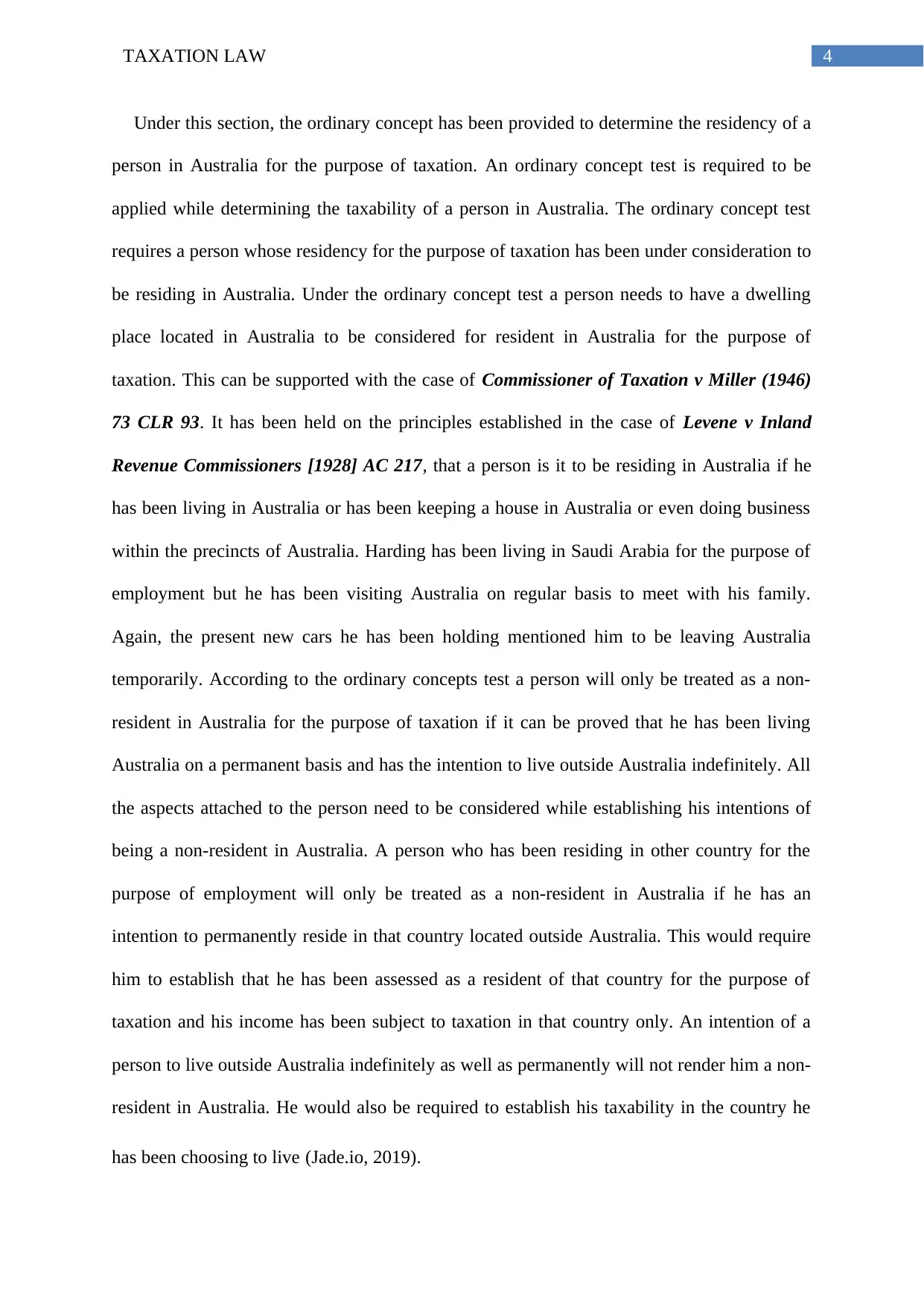
4TAXATION LAW
Under this section, the ordinary concept has been provided to determine the residency of a
person in Australia for the purpose of taxation. An ordinary concept test is required to be
applied while determining the taxability of a person in Australia. The ordinary concept test
requires a person whose residency for the purpose of taxation has been under consideration to
be residing in Australia. Under the ordinary concept test a person needs to have a dwelling
place located in Australia to be considered for resident in Australia for the purpose of
taxation. This can be supported with the case of Commissioner of Taxation v Miller (1946)
73 CLR 93. It has been held on the principles established in the case of Levene v Inland
Revenue Commissioners [1928] AC 217, that a person is it to be residing in Australia if he
has been living in Australia or has been keeping a house in Australia or even doing business
within the precincts of Australia. Harding has been living in Saudi Arabia for the purpose of
employment but he has been visiting Australia on regular basis to meet with his family.
Again, the present new cars he has been holding mentioned him to be leaving Australia
temporarily. According to the ordinary concepts test a person will only be treated as a non-
resident in Australia for the purpose of taxation if it can be proved that he has been living
Australia on a permanent basis and has the intention to live outside Australia indefinitely. All
the aspects attached to the person need to be considered while establishing his intentions of
being a non-resident in Australia. A person who has been residing in other country for the
purpose of employment will only be treated as a non-resident in Australia if he has an
intention to permanently reside in that country located outside Australia. This would require
him to establish that he has been assessed as a resident of that country for the purpose of
taxation and his income has been subject to taxation in that country only. An intention of a
person to live outside Australia indefinitely as well as permanently will not render him a non-
resident in Australia. He would also be required to establish his taxability in the country he
has been choosing to live (Jade.io, 2019).
Under this section, the ordinary concept has been provided to determine the residency of a
person in Australia for the purpose of taxation. An ordinary concept test is required to be
applied while determining the taxability of a person in Australia. The ordinary concept test
requires a person whose residency for the purpose of taxation has been under consideration to
be residing in Australia. Under the ordinary concept test a person needs to have a dwelling
place located in Australia to be considered for resident in Australia for the purpose of
taxation. This can be supported with the case of Commissioner of Taxation v Miller (1946)
73 CLR 93. It has been held on the principles established in the case of Levene v Inland
Revenue Commissioners [1928] AC 217, that a person is it to be residing in Australia if he
has been living in Australia or has been keeping a house in Australia or even doing business
within the precincts of Australia. Harding has been living in Saudi Arabia for the purpose of
employment but he has been visiting Australia on regular basis to meet with his family.
Again, the present new cars he has been holding mentioned him to be leaving Australia
temporarily. According to the ordinary concepts test a person will only be treated as a non-
resident in Australia for the purpose of taxation if it can be proved that he has been living
Australia on a permanent basis and has the intention to live outside Australia indefinitely. All
the aspects attached to the person need to be considered while establishing his intentions of
being a non-resident in Australia. A person who has been residing in other country for the
purpose of employment will only be treated as a non-resident in Australia if he has an
intention to permanently reside in that country located outside Australia. This would require
him to establish that he has been assessed as a resident of that country for the purpose of
taxation and his income has been subject to taxation in that country only. An intention of a
person to live outside Australia indefinitely as well as permanently will not render him a non-
resident in Australia. He would also be required to establish his taxability in the country he
has been choosing to live (Jade.io, 2019).
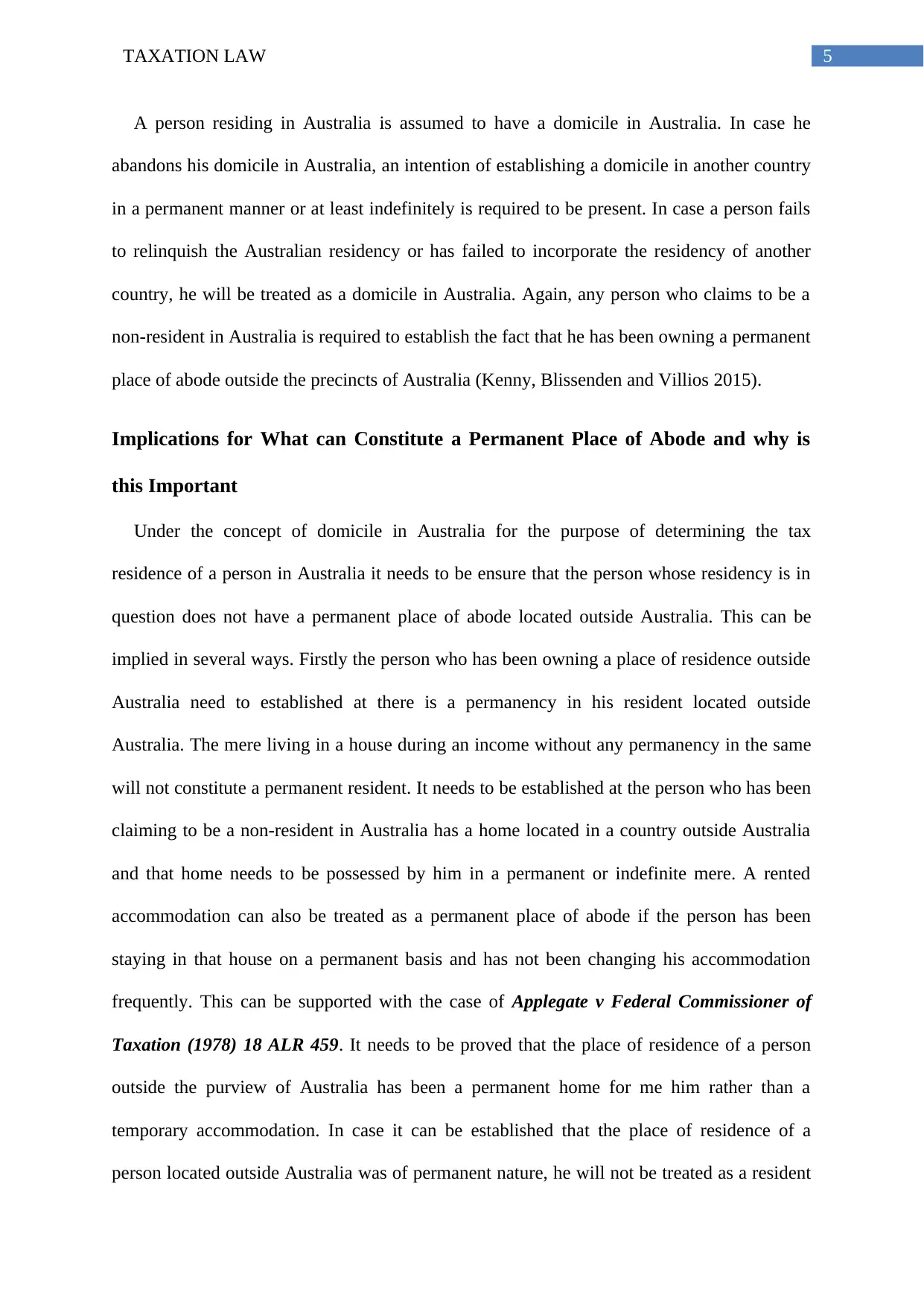
5TAXATION LAW
A person residing in Australia is assumed to have a domicile in Australia. In case he
abandons his domicile in Australia, an intention of establishing a domicile in another country
in a permanent manner or at least indefinitely is required to be present. In case a person fails
to relinquish the Australian residency or has failed to incorporate the residency of another
country, he will be treated as a domicile in Australia. Again, any person who claims to be a
non-resident in Australia is required to establish the fact that he has been owning a permanent
place of abode outside the precincts of Australia (Kenny, Blissenden and Villios 2015).
Implications for What can Constitute a Permanent Place of Abode and why is
this Important
Under the concept of domicile in Australia for the purpose of determining the tax
residence of a person in Australia it needs to be ensure that the person whose residency is in
question does not have a permanent place of abode located outside Australia. This can be
implied in several ways. Firstly the person who has been owning a place of residence outside
Australia need to established at there is a permanency in his resident located outside
Australia. The mere living in a house during an income without any permanency in the same
will not constitute a permanent resident. It needs to be established at the person who has been
claiming to be a non-resident in Australia has a home located in a country outside Australia
and that home needs to be possessed by him in a permanent or indefinite mere. A rented
accommodation can also be treated as a permanent place of abode if the person has been
staying in that house on a permanent basis and has not been changing his accommodation
frequently. This can be supported with the case of Applegate v Federal Commissioner of
Taxation (1978) 18 ALR 459. It needs to be proved that the place of residence of a person
outside the purview of Australia has been a permanent home for me him rather than a
temporary accommodation. In case it can be established that the place of residence of a
person located outside Australia was of permanent nature, he will not be treated as a resident
A person residing in Australia is assumed to have a domicile in Australia. In case he
abandons his domicile in Australia, an intention of establishing a domicile in another country
in a permanent manner or at least indefinitely is required to be present. In case a person fails
to relinquish the Australian residency or has failed to incorporate the residency of another
country, he will be treated as a domicile in Australia. Again, any person who claims to be a
non-resident in Australia is required to establish the fact that he has been owning a permanent
place of abode outside the precincts of Australia (Kenny, Blissenden and Villios 2015).
Implications for What can Constitute a Permanent Place of Abode and why is
this Important
Under the concept of domicile in Australia for the purpose of determining the tax
residence of a person in Australia it needs to be ensure that the person whose residency is in
question does not have a permanent place of abode located outside Australia. This can be
implied in several ways. Firstly the person who has been owning a place of residence outside
Australia need to established at there is a permanency in his resident located outside
Australia. The mere living in a house during an income without any permanency in the same
will not constitute a permanent resident. It needs to be established at the person who has been
claiming to be a non-resident in Australia has a home located in a country outside Australia
and that home needs to be possessed by him in a permanent or indefinite mere. A rented
accommodation can also be treated as a permanent place of abode if the person has been
staying in that house on a permanent basis and has not been changing his accommodation
frequently. This can be supported with the case of Applegate v Federal Commissioner of
Taxation (1978) 18 ALR 459. It needs to be proved that the place of residence of a person
outside the purview of Australia has been a permanent home for me him rather than a
temporary accommodation. In case it can be established that the place of residence of a
person located outside Australia was of permanent nature, he will not be treated as a resident
⊘ This is a preview!⊘
Do you want full access?
Subscribe today to unlock all pages.

Trusted by 1+ million students worldwide
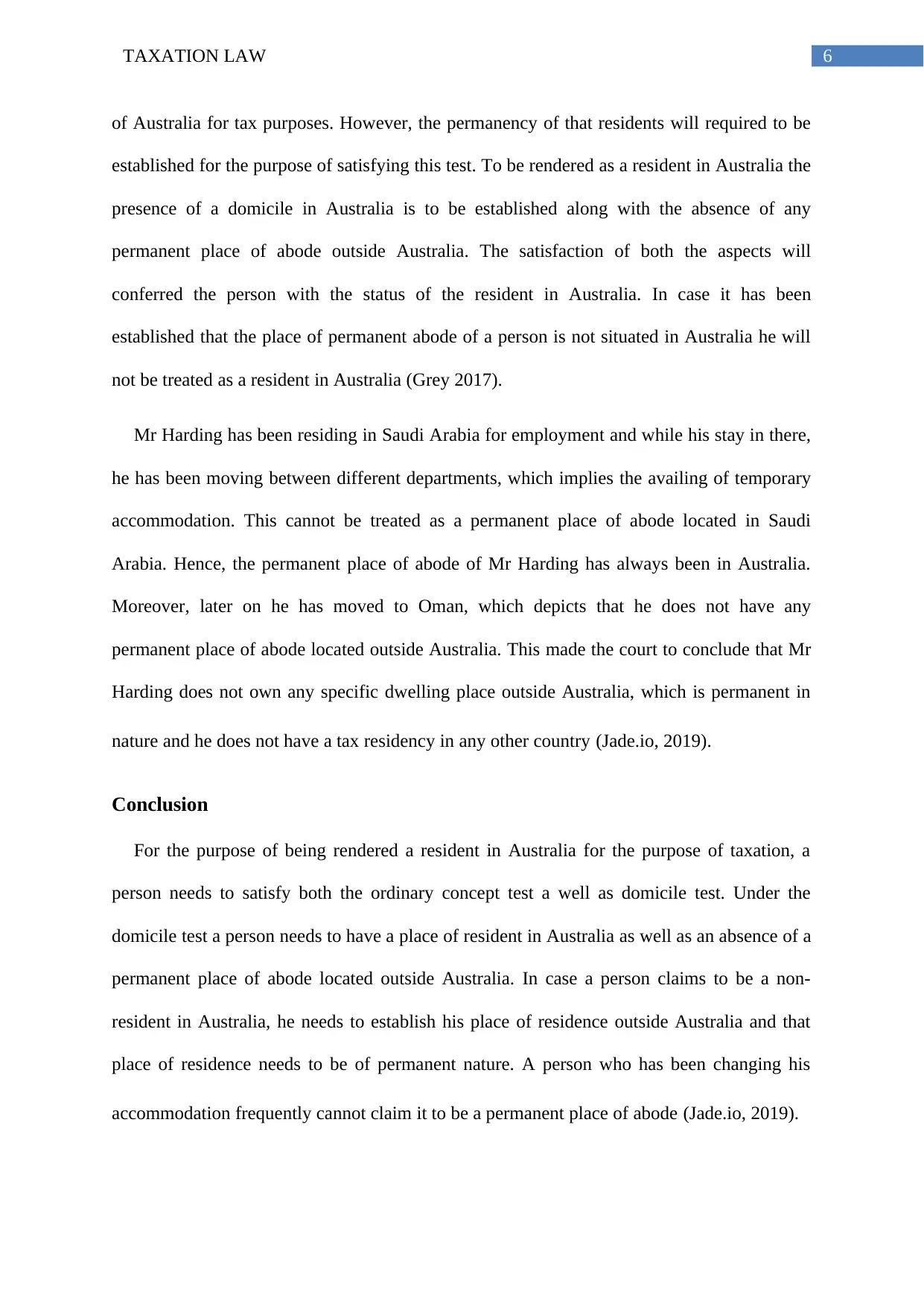
6TAXATION LAW
of Australia for tax purposes. However, the permanency of that residents will required to be
established for the purpose of satisfying this test. To be rendered as a resident in Australia the
presence of a domicile in Australia is to be established along with the absence of any
permanent place of abode outside Australia. The satisfaction of both the aspects will
conferred the person with the status of the resident in Australia. In case it has been
established that the place of permanent abode of a person is not situated in Australia he will
not be treated as a resident in Australia (Grey 2017).
Mr Harding has been residing in Saudi Arabia for employment and while his stay in there,
he has been moving between different departments, which implies the availing of temporary
accommodation. This cannot be treated as a permanent place of abode located in Saudi
Arabia. Hence, the permanent place of abode of Mr Harding has always been in Australia.
Moreover, later on he has moved to Oman, which depicts that he does not have any
permanent place of abode located outside Australia. This made the court to conclude that Mr
Harding does not own any specific dwelling place outside Australia, which is permanent in
nature and he does not have a tax residency in any other country (Jade.io, 2019).
Conclusion
For the purpose of being rendered a resident in Australia for the purpose of taxation, a
person needs to satisfy both the ordinary concept test a well as domicile test. Under the
domicile test a person needs to have a place of resident in Australia as well as an absence of a
permanent place of abode located outside Australia. In case a person claims to be a non-
resident in Australia, he needs to establish his place of residence outside Australia and that
place of residence needs to be of permanent nature. A person who has been changing his
accommodation frequently cannot claim it to be a permanent place of abode (Jade.io, 2019).
of Australia for tax purposes. However, the permanency of that residents will required to be
established for the purpose of satisfying this test. To be rendered as a resident in Australia the
presence of a domicile in Australia is to be established along with the absence of any
permanent place of abode outside Australia. The satisfaction of both the aspects will
conferred the person with the status of the resident in Australia. In case it has been
established that the place of permanent abode of a person is not situated in Australia he will
not be treated as a resident in Australia (Grey 2017).
Mr Harding has been residing in Saudi Arabia for employment and while his stay in there,
he has been moving between different departments, which implies the availing of temporary
accommodation. This cannot be treated as a permanent place of abode located in Saudi
Arabia. Hence, the permanent place of abode of Mr Harding has always been in Australia.
Moreover, later on he has moved to Oman, which depicts that he does not have any
permanent place of abode located outside Australia. This made the court to conclude that Mr
Harding does not own any specific dwelling place outside Australia, which is permanent in
nature and he does not have a tax residency in any other country (Jade.io, 2019).
Conclusion
For the purpose of being rendered a resident in Australia for the purpose of taxation, a
person needs to satisfy both the ordinary concept test a well as domicile test. Under the
domicile test a person needs to have a place of resident in Australia as well as an absence of a
permanent place of abode located outside Australia. In case a person claims to be a non-
resident in Australia, he needs to establish his place of residence outside Australia and that
place of residence needs to be of permanent nature. A person who has been changing his
accommodation frequently cannot claim it to be a permanent place of abode (Jade.io, 2019).
Paraphrase This Document
Need a fresh take? Get an instant paraphrase of this document with our AI Paraphraser
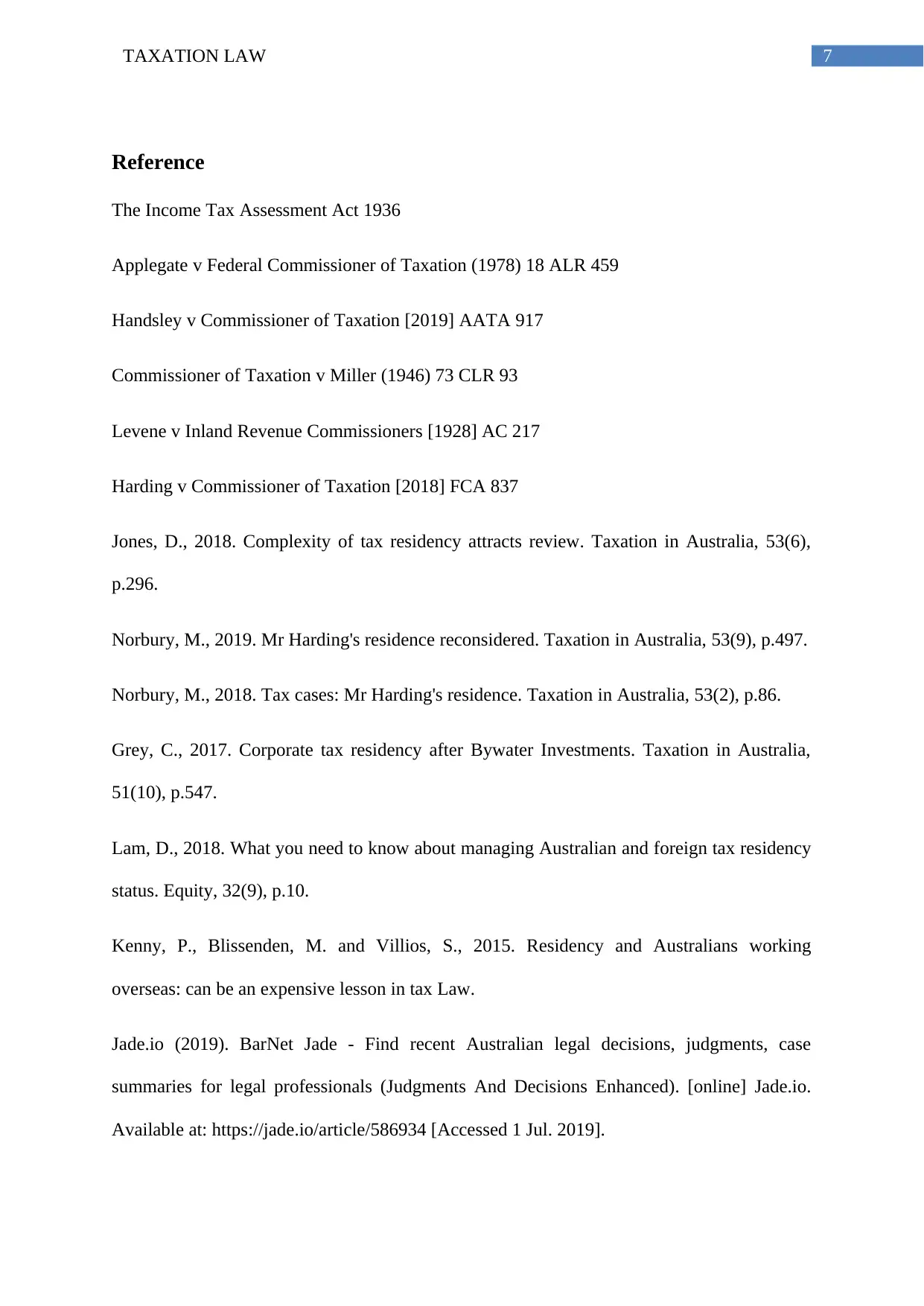
7TAXATION LAW
Reference
The Income Tax Assessment Act 1936
Applegate v Federal Commissioner of Taxation (1978) 18 ALR 459
Handsley v Commissioner of Taxation [2019] AATA 917
Commissioner of Taxation v Miller (1946) 73 CLR 93
Levene v Inland Revenue Commissioners [1928] AC 217
Harding v Commissioner of Taxation [2018] FCA 837
Jones, D., 2018. Complexity of tax residency attracts review. Taxation in Australia, 53(6),
p.296.
Norbury, M., 2019. Mr Harding's residence reconsidered. Taxation in Australia, 53(9), p.497.
Norbury, M., 2018. Tax cases: Mr Harding's residence. Taxation in Australia, 53(2), p.86.
Grey, C., 2017. Corporate tax residency after Bywater Investments. Taxation in Australia,
51(10), p.547.
Lam, D., 2018. What you need to know about managing Australian and foreign tax residency
status. Equity, 32(9), p.10.
Kenny, P., Blissenden, M. and Villios, S., 2015. Residency and Australians working
overseas: can be an expensive lesson in tax Law.
Jade.io (2019). BarNet Jade - Find recent Australian legal decisions, judgments, case
summaries for legal professionals (Judgments And Decisions Enhanced). [online] Jade.io.
Available at: https://jade.io/article/586934 [Accessed 1 Jul. 2019].
Reference
The Income Tax Assessment Act 1936
Applegate v Federal Commissioner of Taxation (1978) 18 ALR 459
Handsley v Commissioner of Taxation [2019] AATA 917
Commissioner of Taxation v Miller (1946) 73 CLR 93
Levene v Inland Revenue Commissioners [1928] AC 217
Harding v Commissioner of Taxation [2018] FCA 837
Jones, D., 2018. Complexity of tax residency attracts review. Taxation in Australia, 53(6),
p.296.
Norbury, M., 2019. Mr Harding's residence reconsidered. Taxation in Australia, 53(9), p.497.
Norbury, M., 2018. Tax cases: Mr Harding's residence. Taxation in Australia, 53(2), p.86.
Grey, C., 2017. Corporate tax residency after Bywater Investments. Taxation in Australia,
51(10), p.547.
Lam, D., 2018. What you need to know about managing Australian and foreign tax residency
status. Equity, 32(9), p.10.
Kenny, P., Blissenden, M. and Villios, S., 2015. Residency and Australians working
overseas: can be an expensive lesson in tax Law.
Jade.io (2019). BarNet Jade - Find recent Australian legal decisions, judgments, case
summaries for legal professionals (Judgments And Decisions Enhanced). [online] Jade.io.
Available at: https://jade.io/article/586934 [Accessed 1 Jul. 2019].

8TAXATION LAW
Jade.io (2019). BarNet Jade - Find recent Australian legal decisions, judgments, case
summaries for legal professionals (Judgments And Decisions Enhanced). [online] Jade.io.
Available at: https://jade.io/article/635593 [Accessed 1 Jul. 2019].
Jade.io (2019). BarNet Jade - Find recent Australian legal decisions, judgments, case
summaries for legal professionals (Judgments And Decisions Enhanced). [online] Jade.io.
Available at: https://jade.io/article/635593 [Accessed 1 Jul. 2019].
⊘ This is a preview!⊘
Do you want full access?
Subscribe today to unlock all pages.

Trusted by 1+ million students worldwide
1 out of 9
Related Documents
Your All-in-One AI-Powered Toolkit for Academic Success.
+13062052269
info@desklib.com
Available 24*7 on WhatsApp / Email
![[object Object]](/_next/static/media/star-bottom.7253800d.svg)
Unlock your academic potential
Copyright © 2020–2026 A2Z Services. All Rights Reserved. Developed and managed by ZUCOL.





